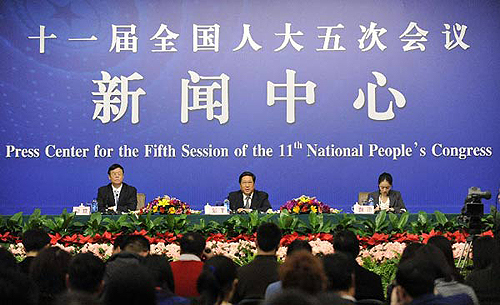|
 |
|
Zhang Ping (C), Minister of the National Development and Reform Commission, speaks at a press conference of the Fifth Session of the 11th National People's Congress (NPC) in Beijing, capital of China, March 5, 2012 (XINHUA) |
China's chief economic planner blamed himself Monday for failing to rein in the country's consumer prices last year.
"China's consumer price growth hit 5.4 percent last year, exceeding the growth target of around 4 percent set at the beginning of 2011. As the head of the government department in charge of controlling prices, I would like to offer self-criticism on this occasion," Zhang Ping, head of the National Development and Reform Commission, told a press conference.
Zhang described last year's economic situation as "very grave," adding that the runaway growth was the result of unsatisfactory government work in certain aspects.
Zhang also noted that the country's inflation rate eased to 4.1 percent in December last year, after hitting a 37-month high of 6.5 percent in July, due to "considerable and hard" work on the part of the government.
China aims to continue to limit this year's consumer price growth to around 4 percent, according to a government work report delivered by Premier Wen Jiabao at the annual parliamentary session on Monday.
Keeping overall prices basically stable is "a key task affecting people's interests and China's overall economic and social development," according to Wen.
"I have confidence in keeping inflation within around 4 percent this year," claimed Zhang.
The lives of many ordinary Chinese are being affected by price hikes and they are expecting the country's lawmakers to take heed of the rising costs of consumer goods and housing, one of their biggest concerns, as the annual session of the National People's Congress opened on Monday.
"Vegetable prices are still too high. If the prices of some vegetables keep growing, I will not buy them at all," said Fang Gui, a 65-year-old retiree and resident of Xi'an, capital of northwest China's Shannxi province.
"Nearly all of my monthly income is spent on living expenses, commuting, my child's education and housing management fees. I can barely save any money now," said Liu Mingbing, a mid-level manager in southwest China's Chongqing Municipality.
Since the beginning of last year, government departments at all levels have been rolling out various measures to curb price increases while simultaneously working to offset the impact on low-income groups by issuing subsidies.
To contain runaway inflation, China's central bank raised banks' reserve requirement ratio 12 times to a record high of 21.5 percent between 2010 and December 2011. It has also hiked interest rates five times since October 2010.
(Xinhua News Agency March 5, 2012) | 